Walking around the streets of New York City is such a pleasure. Here is my favorite sign, from in front of Whole Foods in Union Square:
I told him I’d post this. Be sure to text if you’re interested. Continue reading “A sign and a statue”
Walking around the streets of New York City is such a pleasure. Here is my favorite sign, from in front of Whole Foods in Union Square:
I told him I’d post this. Be sure to text if you’re interested. Continue reading “A sign and a statue”
 If you’re a New Yorker subscriber, you know how relentlessly the weekly magazine arrives. Unread copies piling up around the house could replace the movie image of pages of the calendar flipping by to show elapsed time. But then comes a long plane ride and six or eight unread copies go into my carry on to be consumed like chocolates from a box. Continue reading “In praise of TV”
If you’re a New Yorker subscriber, you know how relentlessly the weekly magazine arrives. Unread copies piling up around the house could replace the movie image of pages of the calendar flipping by to show elapsed time. But then comes a long plane ride and six or eight unread copies go into my carry on to be consumed like chocolates from a box. Continue reading “In praise of TV”
 This morning, Larry read part of David Brooks’ column on the driving economic force of grandiose entrepreneurs. Of course, Steve Jobs would be a prime example, but Brooks focused on Elon Musk, whose serial entrepreneurship has made him a billionaire. While still in college (or maybe graduate school) he identified three areas that he felt would most transform humanity: the Internet, sustainable energy, and space exploration. He’s proceeded to create hugely successful enterprises in all three.
This morning, Larry read part of David Brooks’ column on the driving economic force of grandiose entrepreneurs. Of course, Steve Jobs would be a prime example, but Brooks focused on Elon Musk, whose serial entrepreneurship has made him a billionaire. While still in college (or maybe graduate school) he identified three areas that he felt would most transform humanity: the Internet, sustainable energy, and space exploration. He’s proceeded to create hugely successful enterprises in all three.
Brooks asks if maybe some reader will think “What grand transformational process do I want to be a part of?” Of course, Brooks is talking in terms of economics, of the forces that create opportunities, jobs, and progress, but whether consciously or not, doesn’t each of us transform the world we live in? Continue reading “My grand transformational process”
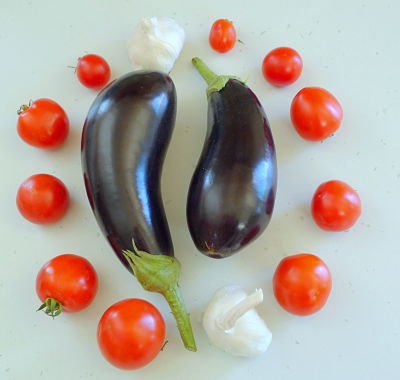 In past gardens, I’ve planted rows of things–many of each plant. In this year’s garden, I limited myself: one zucchini, two eggplant, three cucumbers, five tomatoes. I didn’t want to get overwhelmed at harvest. As it is, the productivity of these few plants is astounding. And an unexpected benefit, when you only have a few plants, the miraculous nature of each burgeoning vegetable comes into its own. I couldn’t resist making a little yin/yang symbol with these glossy eggplants. Or is it yin/yin or yang/yang? Continue reading “Luminous vegetables”
In past gardens, I’ve planted rows of things–many of each plant. In this year’s garden, I limited myself: one zucchini, two eggplant, three cucumbers, five tomatoes. I didn’t want to get overwhelmed at harvest. As it is, the productivity of these few plants is astounding. And an unexpected benefit, when you only have a few plants, the miraculous nature of each burgeoning vegetable comes into its own. I couldn’t resist making a little yin/yang symbol with these glossy eggplants. Or is it yin/yin or yang/yang? Continue reading “Luminous vegetables”
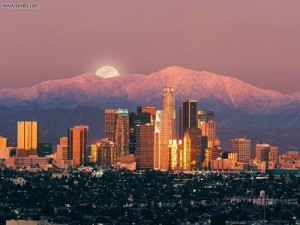 I’ve been thinking about this poem by Martha Ronk. It seems to me to be about a full moon.
I’ve been thinking about this poem by Martha Ronk. It seems to me to be about a full moon.
The Moon over L.A.
The moon moreover spills onto
the paving stone once under foot.
Plants it there one in front.
She is no more than any other except her shoulders forever.
Keep riding she says vacant as the face of.
Pull over and give us a kiss.
When it hangs over the interchange
she and she and she. A monument to going nowhere,
a piece of work unmade by man. O moon
rise up and give us ourselves awash and weary—
we’ve seen it all and don’t mind.
Martha Ronk
Although the syntax is fractured, it makes perfect sense. It might be radically accessible or might not. What do you think? Oh and I called this post sliver of moon because what made me think of this poem was the sliver of moon at the horizon tonight, as black clouds scudded against a pale gold sky.
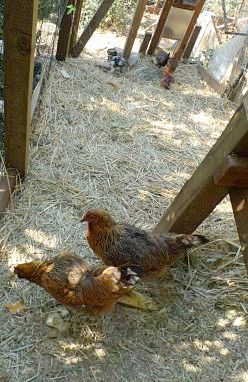 The young chickens–all four of them–have successfully integrated with the existing flock. Despite the dire predictions of my local chicken expert, the older hens did not kill or try to kill the young birds. I followed the advice of the “Chicken Whisperer,” who appeared last year at the Albany library. I bought her book City Chicks, which has advice about everything chicken, including how to clip a rooster’s toenails. She recommended that I introduce them in a cage inside the coop first, then merge them. This gave the older hens a chance to get familiar with their presence. The hens weren’t exactly thrilled to have the newbies, and asserted themselves with some vicious pecks, but there was enough room for the young ones to evade them, and they’ve been together two days now. In general, the young ones stay as far as possible from the older hens. Here they are, keeping their distance. Continue reading “Where metaphors come from”
The young chickens–all four of them–have successfully integrated with the existing flock. Despite the dire predictions of my local chicken expert, the older hens did not kill or try to kill the young birds. I followed the advice of the “Chicken Whisperer,” who appeared last year at the Albany library. I bought her book City Chicks, which has advice about everything chicken, including how to clip a rooster’s toenails. She recommended that I introduce them in a cage inside the coop first, then merge them. This gave the older hens a chance to get familiar with their presence. The hens weren’t exactly thrilled to have the newbies, and asserted themselves with some vicious pecks, but there was enough room for the young ones to evade them, and they’ve been together two days now. In general, the young ones stay as far as possible from the older hens. Here they are, keeping their distance. Continue reading “Where metaphors come from”
I don’t know exactly why translating poetry is so fascinating. For me, it’s a way to work on a poem when I have no ideas of my own. The demands of translation–the fact that a literal translation just won’t do, and that you have to try to somehow capture the spirit of the poem without straying too far from the literal–is the challenge and the art. In some ways, I feel that all poetry is translation–sometimes I’m trying to translate my own glimmers of an idea, sometimes those of someone else.
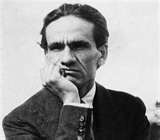 A decade ago, when Bob Hass had his weekly poetry column in a number of daily papers, he printed a translation of a poem by the Peruvian poet Cesar Vallejo. I’ve mentioned these columns before–they’ve been collected into two books, Poet’s Choice and Now and Then–great morning readings, both of them. You can find Bob’s original column on Vallejo in the Washington Post archives.
A decade ago, when Bob Hass had his weekly poetry column in a number of daily papers, he printed a translation of a poem by the Peruvian poet Cesar Vallejo. I’ve mentioned these columns before–they’ve been collected into two books, Poet’s Choice and Now and Then–great morning readings, both of them. You can find Bob’s original column on Vallejo in the Washington Post archives.
At the time I didn’t know about the column, and happened to read the one on Vallejo riding home on BART, chancing on it in an abandoned copy of the San Francisco Examiner. Bob printed the Stanley Burnshaw translation and one of his own. Ed Hirsch, when he did his own version of Poet’s Choice, printed Robert Bly’s translation. Here is the Spanish: Continue reading “The fascination of translation”
Most of us read 1984 or Animal Farm in high school. But I think it’s in his essays that Orwell is without peer. They’ve just published his diaries, seventy-odd years after his death. Based on the reviews they seem mostly to track his domestic, gardening and husbandry concerns. I was excited to read that he had 10 Moroccan hens, and carefully tracked their egg production.
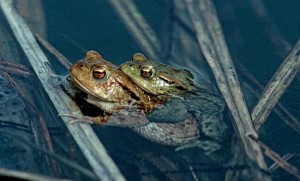 Years ago I bought the four volume set of Orwell’s essays. Volume four is my favorite. It contains essays like “Revenge is Sour,” “Such, Such Were the Joys,” and “How the Poor Die,” along with his “As I Please” columns which ran regularly. My favorite of his essays, though, is “Some Thoughts on the Common Toad.” You can read it and his other essays online. In this one, he talks about toads mating in spring, and about spring in general and its democratic pleasures: “Even in the most sordid street the coming of spring will register itself by some sign or other, if it is only a brighter blue between the chimney pots or the vivid green of an elder sprouting on a blitzed site. Indeed it is remarkable how Nature goes on existing unofficially, as it were, in the very heart of London.” Continue reading “Some thoughts on the common toad”
Years ago I bought the four volume set of Orwell’s essays. Volume four is my favorite. It contains essays like “Revenge is Sour,” “Such, Such Were the Joys,” and “How the Poor Die,” along with his “As I Please” columns which ran regularly. My favorite of his essays, though, is “Some Thoughts on the Common Toad.” You can read it and his other essays online. In this one, he talks about toads mating in spring, and about spring in general and its democratic pleasures: “Even in the most sordid street the coming of spring will register itself by some sign or other, if it is only a brighter blue between the chimney pots or the vivid green of an elder sprouting on a blitzed site. Indeed it is remarkable how Nature goes on existing unofficially, as it were, in the very heart of London.” Continue reading “Some thoughts on the common toad”
After weeks of brush clearing, part ordering, putting up insulators, and stringing wire, we have a functioning electric fence surrounding the chicken run.
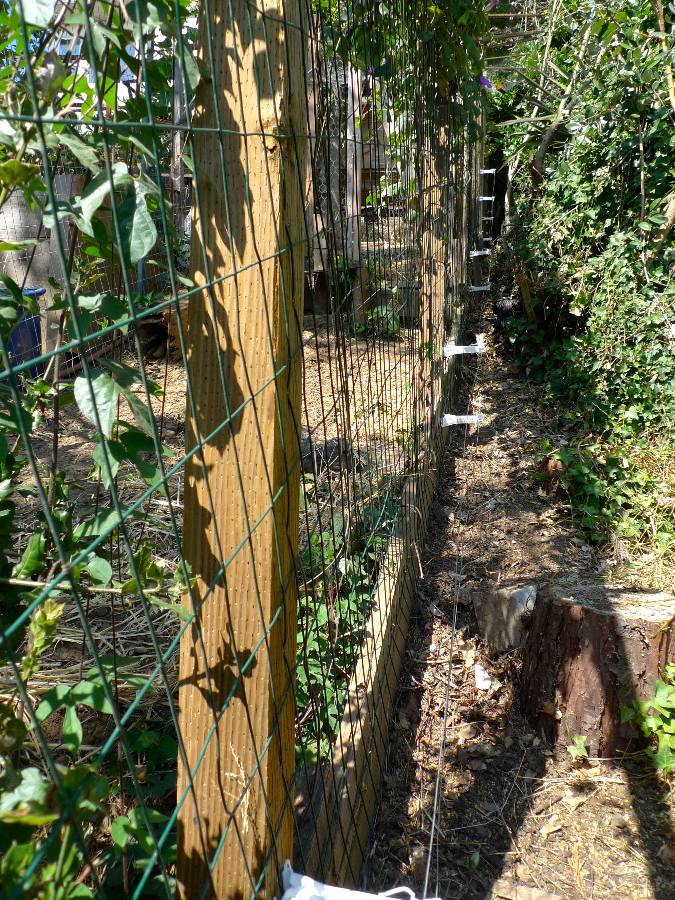 Since Tuesday, when we went live, I heard the foxes the first morning–that is I heard the chickens sounding their raucous alarm–but have not seen any foxes and they have not been audible or visible since Wednesday. I dare to hope the chickens are safe. Continue reading “Houston, we have liftoff”
Since Tuesday, when we went live, I heard the foxes the first morning–that is I heard the chickens sounding their raucous alarm–but have not seen any foxes and they have not been audible or visible since Wednesday. I dare to hope the chickens are safe. Continue reading “Houston, we have liftoff”